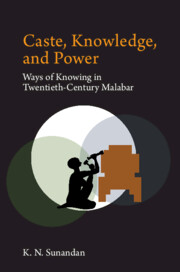Book contents
- Frontmatter
- Contents
- Acknowledgements
- Notes on Transliteration
- Introduction: Caste, Knowledge, and Power
- 1 An Ashari World of Knowing
- 2 An Ashari World of Ignoring
- 3 A Nampoothiri World of Acharam
- 4 Nampoothiris and the Order of Knowledge
- 5 Asharis and the Order of Knowledge
- Postscript: Towards an Artisanal Way of Practice of Knowing
- Bibliography
- Index
1 - An Ashari World of Knowing
Published online by Cambridge University Press: 11 October 2022
- Frontmatter
- Contents
- Acknowledgements
- Notes on Transliteration
- Introduction: Caste, Knowledge, and Power
- 1 An Ashari World of Knowing
- 2 An Ashari World of Ignoring
- 3 A Nampoothiri World of Acharam
- 4 Nampoothiris and the Order of Knowledge
- 5 Asharis and the Order of Knowledge
- Postscript: Towards an Artisanal Way of Practice of Knowing
- Bibliography
- Index
Summary
In early twentieth-century Malabar, Asharis inhabited an ‘Ashari world’ that was constituted and reconstituted through daily life practices. Asharippani (carpentry) was the central organizing category and activity that determined the process of the constitution of this world. Asharis also engaged with many worlds outside their own, such as the world of plants, worlds of other jatis, and the world of the sayip (the white man). Imagining and constituting a world involves two actions: defining the boundaries and detailing the inner space–time of the world. This means that creating and sustaining a world is a simultaneous process of reproducing difference with the other worlds and sameness within one's own world. Jati was the crucial aspect in this boundary-making or difference-making process, and this process was very much connected to the defining and redefining of the internal constitutive elements within the Ashari world. Asharippani was understood as the defining activity of forming a unique Ashari world and, at the same time, it was also considered the activity that separated the Ashari world from the other worlds.
Asharis imagined that the meaning and essence of humans, plants, animals, and objects varied according to two important factors: the location or the world of the knowing subject and the position or the world of the object of knowing. This also meant that the facts and truths that were applicable to one world might not be valid in a different world. Jati boundaries limited the degrees of generalization of truth, and these boundaries determined not only the possibilities of belonging but also the very being in any world: a tree which originally belonged to the world of plants became a different entity when it was brought into the world of Asharis. Similarly, an object perceived from the Ashari world and the same perceived from the Nampoothiri world have very different essence or existence.
In this chapter, I compare the Ashari practices with contemporary scientific and technological practices and also with the academic scholarship on indigenous practices; no need to mention that the descriptions of the Ashari perspectives are my interpretation of Ashari narratives. Through this analysis, I attempt to point out that the categories such as modern and pre-modern as a prefix to knowledge are not useful in understanding various practices of knowing in the colonial world.
- Type
- Chapter
- Information
- Caste, Knowledge, and PowerWays of Knowing in Twentieth Century Malabar, pp. 24 - 60Publisher: Cambridge University PressPrint publication year: 2023



